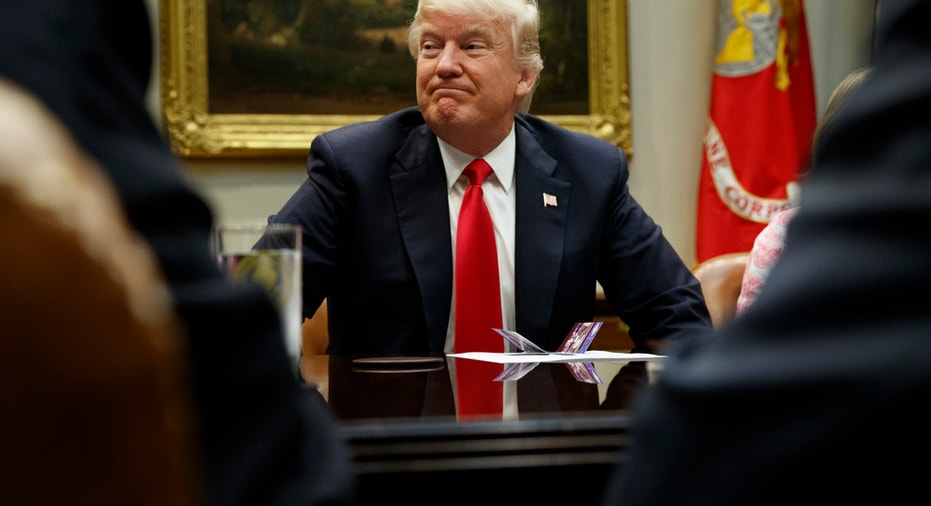Trump's Concession on Wall Funding Removes Obstacle From Spending Talks

The threat of a U.S. government shutdown this weekend appeared to recede on Tuesday after President Donald Trump backed away from a demand that Congress include funding for his planned border wall with Mexico in a spending bill.
However, even if the fight over wall funding is over, Republicans and Democrats still have some difficult issues to resolve as they face a Friday night deadline.
There was growing sentiment in Congress that they will need to opt for a short-term extension of current spending, possibly of one week's duration, in order to finish up negotiations on the longer-term bill for funding through the end of September.
“Yeah, it looks like it,” said Republican Senator Lisa Murkowski, a Senate Appropriations Committee member, when asked by a reporter about the likelihood of a short-term extension.
Senate Majority Leader Mitch McConnell said, however, that it was too soon to talk about such a possibility and that negotiations were still under way to reach a longer-term deal.
Trump removed a crucial sticking point when he said on Monday evening that he may wait until Republicans begin drafting the budget blueprint for the fiscal year that starts on Oct. 1 to seek funds for the wall.
The president's fellow Republicans control both chambers of Congress, but the current spending bill, which has to be passed by Friday night, will need 60 votes to clear the 100-member Senate, where Republicans hold 52 seats. Democratic leaders had said they would not support a bill that included funds for the wall.
If no spending measure covering April 29 to Sept. 30 is in place before 12:01 a.m. (0401 GMT) on Saturday, government funds will halt and hundreds of thousands of the country's several million federal employees will be temporarily laid off.
Trump had run the risk of being blamed by Democrats for a shutdown whose start would coincide with the day he marks 100 days in office.
Senate Democratic leader Chuck Schumer welcomed Trump's Monday night comments and noted that there were opponents of the wall among Republicans too.
“It’s really good news that the president seems to be taking the wall off the table," Schumer said on the Senate floor on Tuesday. “It would remove the prospect of a needless fight over a poison pill proposal that members of both parties don’t support. ... If the threat of the wall is removed, as I hope is the case, our negotiations can continue and we can, hopefully, resolve all of the outstanding issues by Friday.”
SHORT-TERM OPTION
The border wall, which Trump says is the best way to halt the flow of illegal immigrants and drugs into the country, was a signature election pledge last year.
By dropping his call for immediate funding for it, he may clear a path to a spending bill but he loses something to tout as progress on his agenda since taking office on Jan. 20. A White House effort later this year to get Congress to fund the wall could face a similar fate given that some Republicans also oppose it.
Republican Senator Jeff Flake, who represents the southwestern border state of Arizona, speaking to reporters on Tuesday, said there is a need for a wall in some border locations and alternative deterrents in others.
“A lot of us have been pushing for additional border security funding for a while, but a solitary 2,000-mile wall has never been a must-have for anybody in a border state,” he said.
Trump, however, said he had not changed his stance, tweeting on Tuesday, "It will get built and help stop drugs, human trafficking etc."
Trump has said Mexico will eventually repay the United States for the wall, but the Mexican government has been adamant it will not do so, and Trump has not laid out a plan to compel it. Internal Department of Homeland Security estimates have put the cost at $21.6 billion.
Republican Senator Roger Wicker said there was a "substantial figure" in the spending bill dedicated to border security. Such spending, not explicitly for a wall, would likely be acceptable to both parties.
Congressman Steny Hoyer, the No. 2 Democrat in the House of Representatives, said he would advise his colleagues to support a short-term funding proposal only if a longer-term fix was imminent.
Short-term funding measures, which are known as continuing resolutions and which cover periods of days or weeks, have been used to avert government shutdowns in the past. But in 2013, conservative Republicans forced a 17-day shutdown in a failed attempt to repeal then-President Barack Obama's healthcare law, the Affordable Care Act.
(By Susan Cornwell and Richard Cowan; Additional reporting by Amanda Becker; Writing by Frances Kerry; Editing by Jonathan Oatis)



















